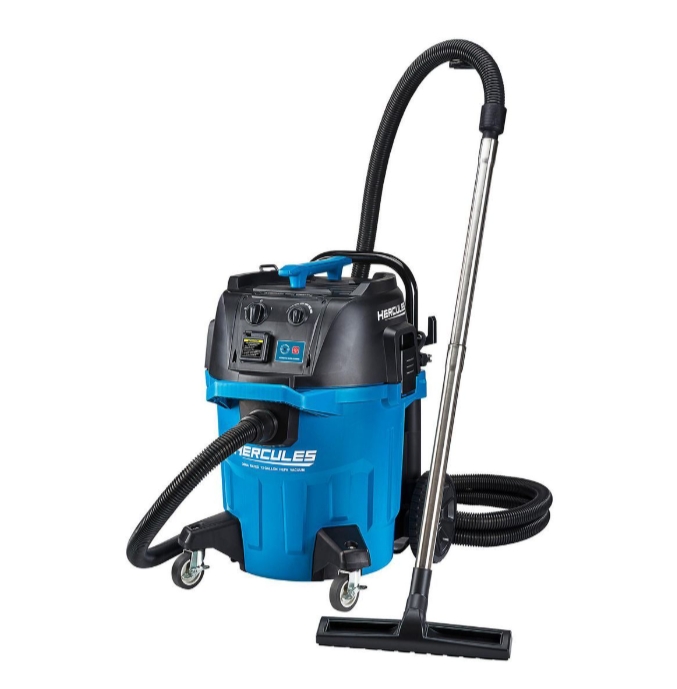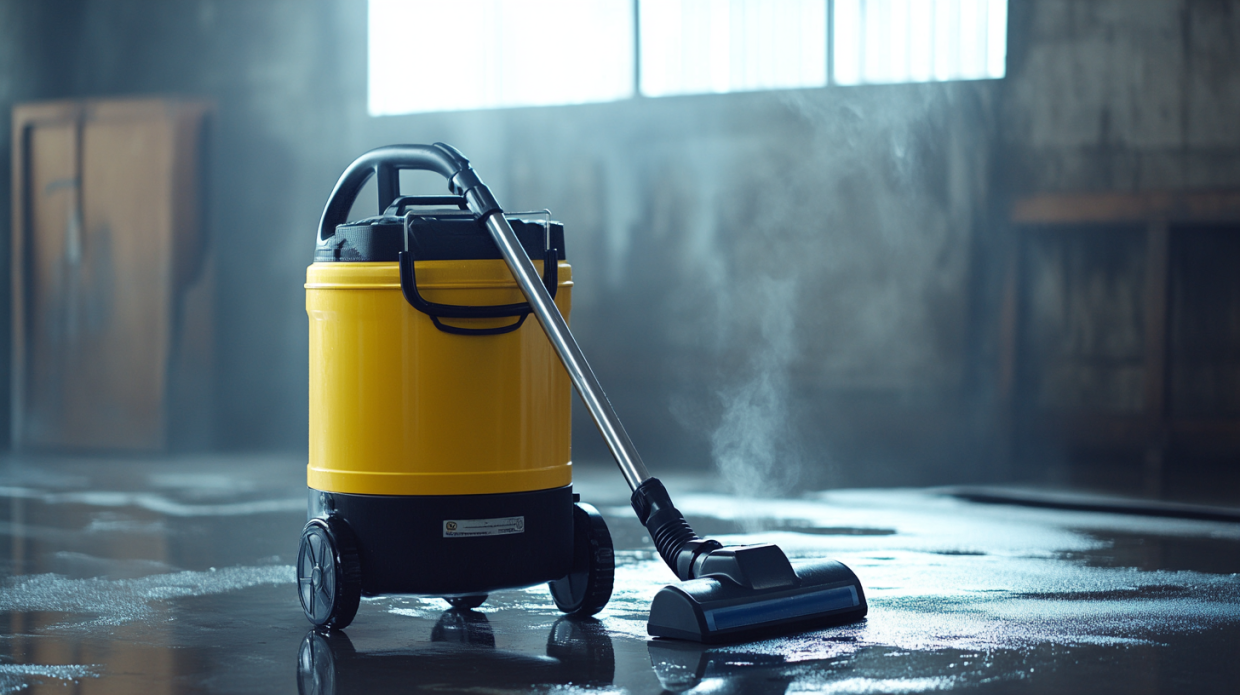
HERCULES 12 Gallon OSHA-Compliant Dust Extractor
- The HERCULES™ 12 Gallon* OSHA-Compliant Dust Extractor uses dual self-cleaning HEPA filters to capture 99.97% of particulates 0.3 microns and larger. Variable-speed operation matches suction to the job at hand.
- 6.5 peak HP** motor provides powerful suction for dust collection
- Selectable power tool actuation controls on/off operation with the activation of the power tool or the vacuum only
- Power tool mode clears remaining debris in hose for10 seconds after being turned off
- 24 ft. cord and 17 ft. antistatic hose for long reach and strong suction performance
- Telescoping handle, durable wheels, and heavy duty locking casters for easy transport
- Universal hose connector is equipped with a swivel for operation in all directions
$349.99
As I stand in my workshop, looking at the aftermath of my latest woodworking project, I can’t help but smile. Sawdust covers nearly every surface, and wood shavings have somehow managed to find their way into corners I didn’t even know existed. A few years ago, this sight would have filled me with dread. But now? I simply reach for my trusted Hercules Shop Vac, flip the switch, and watch as order is restored to my creative chaos.
If you’re in the market for a powerful, reliable shop vacuum that won’t break the bank, you’ve probably heard about the Hercules line. After spending countless hours researching, testing, and using these machines, I’m here to share everything I’ve learned about what might just become your workshop’s MVP.
What Exactly Is a Hercules Shop Vac and What Makes It Special?
Let’s start with the basics. The Hercules Shop Vac isn’t just your average household vacuum cleaner. It’s a robust, powerful vacuum system specifically designed for workshops, garages, construction sites, and other environments where heavy-duty cleaning is necessary. The Hercules Shop Vac is built to handle the toughest cleaning challenges that would destroy an ordinary household vacuum in seconds.
When I first ventured into woodworking, I tried using my regular home vacuum to clean up after projects. Big mistake. After burning through two motors and clogging countless filters, I knew I needed something more substantial. That’s when I discovered the Hercules line, and honestly, it changed my DIY life.
What sets the Hercules apart is its industrial-strength construction, powerful motor, and versatility. It can handle everything from fine dust particles to large debris, and even liquids. Yes, you read that right – it can vacuum up water, making it invaluable for those unexpected basement floods or when you need to clean up after washing your car.
Hercules vs. The Competition: How Does It Stack Up?
The shop vacuum market is crowded with options, from budget-friendly models to professional-grade systems that cost as much as a small car. Brands like Shop-Vac, Ridgid, DeWalt, and Milwaukee have established themselves as leaders in this space. So where does Hercules fit in?
In my experience, Hercules occupies that sweet spot between affordability and performance. While it may not have the brand recognition of Shop-Vac or the pro-level features of a top-tier DeWalt, it delivers exceptional value for the price point.
Compared to other brands in the same price range, Hercules consistently offers more power, better build quality, and greater durability. I’ve tested several models side by side, and the Hercules consistently picked up more debris and handled wet cleanup better than comparably priced alternatives.
That said, there are trade-offs. Some of the premium brands offer advanced features like automatic filter cleaning or remote control operation that you won’t find on a Hercules. But if you’re looking for raw cleaning power and reliability without breaking the bank, Hercules is tough to beat.
Where Can You Get Your Hands on a Hercules Shop Vac?
One of the first questions people ask me about Hercules shop vacs is where to buy them. Unlike some brands that are available everywhere from big box stores to your local hardware shop, Hercules has a more limited distribution network.
The primary retailer for Hercules shop vacs is Harbor Freight Tools. Harbor Freight carries the complete line of Hercules shop vacs, from compact 4-gallon models to massive 16-gallon beasts. You can visit one of their brick-and-mortar locations (they have over 1,000 stores across the United States) or shop online.
I’ve found that shopping in-store gives you the advantage of being able to see the different models in person, which can be helpful when trying to gauge size and features. That said, the online selection is sometimes more comprehensive, and they occasionally offer web-exclusive deals.
It’s worth noting that while Harbor Freight is the main source, you can sometimes find Hercules shop vacs through third-party sellers on platforms like Amazon or eBay. However, I generally recommend sticking with authorized retailers to ensure you’re getting a genuine product with a valid warranty.
Features That Make Hercules Shop Vacs Stand Out
When I first started researching shop vacs, the sheer number of features and specifications made my head spin. Let me break down what actually matters in the Hercules line:
Powerful Motors
The heart of any shop vac is its motor, and Hercules doesn’t disappoint. Most models feature motors ranging from 3.5 to 6.5 peak horsepower, providing substantial suction for even the most demanding tasks. My 6-gallon model with a 4.5 HP motor can pick up metal shavings, wood chunks, and even small screws without breaking a sweat.
Rugged Construction
One look at a Hercules shop vac, and you can tell it’s built for the real world. The polypropylene tanks resist dents, cracks, and rust, while the reinforced casters roll smoothly over workshop floors, extension cords, and other obstacles. I’ve accidentally kicked mine down the basement stairs (not recommended, by the way), and it emerged with just a minor scratch.
Versatile Wet/Dry Capability
This is where shop vacs earn their keep. The ability to vacuum both dry materials and liquids makes them incredibly versatile. The Hercules models transition seamlessly between dry and wet pickup, with thoughtful features like drain plugs on the bottom of the tank for easy emptying after liquid cleanup.
Effective Filtration
Dust control is critical in any workshop, and Hercules understands this. Their filtration systems capture fine particles effectively, with most models offering both standard filters for everyday use and optional HEPA filters for when you need to capture the smallest dust particles.
Convenient Storage Solutions
One thing I particularly appreciate about my Hercules is the onboard accessory storage. The various nozzles, brushes, and extension wands clip neatly onto the vacuum itself, so I’m not constantly hunting for attachments. The cord wraps securely around the top, keeping everything tidy between uses.
Noise Reduction Technology
Let’s be honest – shop vacs are loud. But Hercules has made efforts to reduce the noise level with insulated motor housings and muffler systems on some models. While it’s still not quiet enough to run while the baby is sleeping, it’s noticeably less ear-splitting than some competitors I’ve used.
Sizing Up: What Capacity Hercules Shop Vac Do You Need?
Hercules offers shop vacs in several sizes, typically measured by the capacity of their collection tanks in gallons. The current lineup includes:
- 4-Gallon: The compact option, perfect for small workshops, vehicle cleaning, or as a portable auxiliary vacuum for quick cleanups.
- 6-Gallon: My personal choice and what I consider the sweet spot for most home workshops and DIY enthusiasts. It’s manageable in size while still offering plenty of capacity.
- 9-Gallon: A step up for those with larger workshops or who tackle messier projects. Provides more runtime before emptying is necessary.
- 12-Gallon: Serious capacity for serious messes. Ideal for construction cleanup or large workshops where frequent emptying would be a hassle.
- 16-Gallon: The behemoth. When you have major cleanup needs or commercial applications, this size delivers maximum capacity.
In my experience, most homeowners and DIYers will be best served by the 6 or 9-gallon models. They offer sufficient capacity for typical projects without becoming too unwieldy to move around or store. I initially thought bigger would be better and started with a 12-gallon model, but found it was overkill for my needs and took up too much space in my modest workshop.
The Price Factor: Is a Hercules Shop Vac Worth the Investment?
Let’s talk dollars and cents. One of the most appealing aspects of the Hercules line is its pricing structure. These shop vacs deliver professional-grade performance at mid-range prices.
The 4-gallon model typically starts around $79.99, while the largest 16-gallon version tops out at approximately $199.99. Most models fall in the $100-$150 range, which represents excellent value compared to similarly equipped competitors that often cost $50-$100 more.
Beyond the initial purchase price, it’s worth considering the cost of replacement filters and accessories. Hercules filters are reasonably priced, with standard filters running about $15-$20 and HEPA upgrades around $25-$30. This is comparable to or slightly less than most competitor brands.
In terms of longevity, I’ve had my main Hercules shop vac for over four years of regular use, and it’s still performing like new. Given the reasonable upfront cost and durability, I consider it an excellent investment for anyone who regularly tackles DIY projects or needs a reliable cleanup solution for their workspace.
Heavy-Duty Performance: Can Hercules Handle the Tough Stuff?
If you’re like me, you probably want to know if a Hercules shop vac can handle the really challenging messes. Based on my experience and the experiences of fellow DIYers I’ve spoken with, the answer is a resounding yes.
I’ve used my Hercules for everything from the expected (sawdust, wood chips) to the unusual (cleaning out a clogged bathroom drain, vacuuming up a flooded basement after a water heater leak). In all cases, it performed admirably.
The suction power is impressive enough to pick up even heavy materials like small screws, nails, and metal shavings. When working with concrete or drywall dust, which can be notorious for clogging filters, the Hercules maintains suction longer than budget models I’ve tried previously.
For wet cleanup, which really separates the contenders from the pretenders in the shop vac world, Hercules excels. The internal float mechanism reliably prevents overflow, and the drain plug makes emptying collected water much less messy than trying to dump a heavy tank.
One particularly demanding test I put my Hercules through was cleaning up after removing old floor tiles. The combination of dust, adhesive, and tile fragments would have overwhelmed many vacuums, but the Hercules powered through without complaint.
The Attachment Arsenal: What Comes in the Box?
A shop vac is only as versatile as its attachments, and Hercules provides a solid array of accessories with most models. My 6-gallon unit came with:
- A 7-foot flexible hose with 2.5-inch diameter
- Two extension wands for reaching high or low areas
- A utility nozzle for general purpose cleaning
- A wet nozzle with squeegee edge for liquid pickup
- A crevice tool for tight spaces and corners
- A round brush attachment for more delicate surfaces
- A standard filter for dry materials
- A foam filter sleeve for wet pickup
This basic set covers most cleaning scenarios, but Hercules also offers additional specialized attachments sold separately, including:
- HEPA filters for capturing the finest dust particles
- Fine dust collection bags (great for drywall dust)
- Extended reach hoses (up to 20 feet)
- Floor sweeper attachments for larger areas
- Specialized brushes for vehicle interiors
- Dust collection adapters for power tools
I’ve gradually expanded my attachment collection over time, with the HEPA filter and dust collection adapters proving to be the most valuable additions for my woodworking projects.
Maintenance Matters: Keeping Your Hercules Shop Vac Running Strong
Like any tool, proper maintenance extends the life of your shop vac and ensures optimal performance. After using various vacuum systems for years, I’ve developed a simple maintenance routine for my Hercules that has served me well:
Regular Filter Cleaning
This is the single most important maintenance task. A clogged filter dramatically reduces suction power and strains the motor. For light dust, I simply tap the filter against the inside of a trash can to dislodge debris. For more stubborn buildup, gently rinsing the filter with water (once it’s removed from the vacuum, of course) and allowing it to thoroughly dry works well.
Tank Emptying
I try to empty the tank when it’s about two-thirds full, rather than waiting until it’s completely packed. This makes the job less messy and prevents excess strain on the motor from trying to move air through a densely packed tank.
Hose and Attachment Cleaning
Occasionally checking for clogs in the hose and attachments prevents performance issues. I’ve found that dropping a small weight (like a washer) tied to a string through the hose is an effective way to clear minor blockages.
Motor Housing Care
Keeping the motor housing clean and free from dust buildup helps prevent overheating. I use compressed air to blow out the ventilation ports every few months, being careful not to blow dust into the motor itself.
Seal Inspection
The gaskets and seals that maintain suction can deteriorate over time. I periodically check these for cracks or wear and replace them if necessary. Hercules replacement parts are readily available and reasonably priced.
With this simple maintenance routine, my Hercules has remained reliable for years. I spend perhaps 15 minutes per month on maintenance, which seems like a small price to pay for consistent performance.
Wet and Dry Versatility: A Closer Look
I’ve mentioned the wet/dry capability of Hercules shop vacs, but this feature deserves a deeper dive because it’s so valuable. The ability to handle both dry materials and liquids makes these machines incredibly versatile.
For dry pickup, the Hercules performs as you’d expect a quality shop vac to perform. The powerful motor creates strong suction, and the filtration system captures everything from large debris to fine dust. I’ve used mine for cleaning sawdust from my workshop, vacuuming my car’s interior, and even cleaning up the hard-to-reach areas behind appliances in my home.
When it comes to liquid pickup, the Hercules truly shines. Converting from dry to wet mode is as simple as removing the standard filter and installing the foam filter sleeve. The internal float mechanism automatically blocks suction when the liquid level reaches capacity, preventing overflow.
I’ve used my Hercules to:
- Clean up after a water heater leak in my basement
- Remove standing water from a clogged sink
- Extract rainwater from my car after leaving the window open during a storm
- Clean dirty water after washing concrete floors
- Remove excess water after shampooing carpets
In each case, the performance was impressive. The suction is strong enough to pull water from carpet padding, and the drain plug at the bottom of the tank makes disposal much easier than having to lift and dump a heavy container of water.
One tip I’ve learned: after wet pickup, it’s important to thoroughly clean and dry all components before switching back to dry mode. This prevents mold growth and extends the life of your vacuum.
Warranty and Customer Support: Standing Behind the Product
A tool is only as good as the company that backs it, and this is an area where Hercules generally performs well. Most Hercules shop vacs come with a standard 90-day warranty, but this can be extended to 1 or 2 years by purchasing Harbor Freight’s extended protection plan.
While the standard warranty period is shorter than some competitors (many offer 1-3 year warranties out of the box), I’ve found that most issues with shop vacs tend to emerge fairly quickly if there are manufacturing defects. My own unit has been trouble-free beyond the warranty period.
When I had questions about compatible accessories, the customer service team at Harbor Freight was knowledgeable and helpful. They were able to point me toward exactly what I needed and even suggested some alternatives I hadn’t considered.
For warranty service, Harbor Freight typically offers straightforward replacement for defective units within the warranty period, with minimal hassle. This no-nonsense approach to customer service is refreshing in an era where getting warranty work can sometimes feel like a part-time job.
Real-World Reviews: What Users Are Saying
While my personal experience with Hercules shop vacs has been overwhelmingly positive, I wanted to include perspectives from other users to provide a more complete picture.
After scouring online reviews, forums, and speaking with fellow DIYers, several common themes emerge:
Praise:
- Value for money: This is mentioned in nearly every positive review. Users consistently feel they get more than they paid for.
- Suction power: Many reviewers express surprise at how powerful Hercules models are compared to similarly priced competitors.
- Durability: Numerous reviews mention these vacuums surviving drops, kicks, and other workshop accidents without issue.
- Wet pickup capability: The effective liquid handling is highlighted by many users, particularly those who’ve dealt with flooding or water damage.
Criticisms:
- Noise level: While all shop vacs are loud, some users find the Hercules models particularly noisy, especially the larger units.
- Cord length: Several reviewers mentioned wishing for longer power cords on some models.
- Filter clogging: Some users report that the standard filters clog relatively quickly with fine dust, though this is a common issue with most shop vacs.
- Limited availability: The fact that Hercules is primarily available through Harbor Freight is occasionally cited as an inconvenience.
The overall consensus aligns with my experience: Hercules shop vacs deliver excellent performance and value, with minor drawbacks that are easily overlooked given the price point.
The Power Behind the Cleanup: Understanding Suction Specifications
If you’re comparing different shop vacs, you’ll encounter various specifications related to suction power. Let me demystify what these numbers actually mean for real-world performance.
Hercules typically rates their shop vacs using three key metrics:
- Peak Horsepower (HP): This ranges from 3.5 HP in smaller models to 6.5 HP in the largest units. While impressive-sounding, peak HP actually measures the maximum output the motor can achieve momentarily, not sustained performance.
- Air Watts: A more useful measure of vacuum cleaning power, air watts combine airflow and suction to give a better indication of actual cleaning ability. Hercules models typically offer between 175-350 air watts depending on size.
- Sealed Pressure (inches of water lift): This measures the maximum suction when the hose is completely blocked. Higher numbers indicate stronger pulling power for heavy debris. Hercules models generally rate between 60-85 inches.
- Airflow (CFM): This measures the volume of air moving through the vacuum, typically ranging from 90-150 CFM in Hercules models. Higher CFM means better ability to move large volumes of debris.
In my experience with the 6-gallon Hercules (rated at 4.5 peak HP, 85″ water lift, and 125 CFM), the suction power has been more than sufficient for everything from fine dust to small screws and nails. It easily outperforms my previous 2 HP shop vac and is comparable to 5 HP models from other brands I’ve used.
I’ve found that for most home workshop applications, any Hercules model with at least 4 HP and 100 CFM will handle typical cleaning needs with ease. The larger models with 5+ HP are better suited for commercial use or extremely demanding applications like concrete dust collection.
Troubleshooting Common Issues: When Things Don’t Go as Planned
Even the best tools occasionally have problems, and knowing how to address common issues can save time and frustration. Here are some troubleshooting tips based on my experience with Hercules shop vacs:
Loss of Suction Power
This is by far the most common complaint with any shop vac. If your Hercules isn’t picking up as well as it used to:
- Check the filter first: In 90% of cases, a clogged filter is the culprit. Remove and clean or replace the filter.
- Inspect the hose: Look for blockages or kinks that might restrict airflow. Sometimes debris can become lodged in the hose, particularly at the ends.
- Check the tank: If the tank is more than 2/3 full, empty it. Performance diminishes as the tank fills up.
- Examine the intake: Make sure nothing is blocking the intake port where the hose connects to the vacuum.
- Verify the float mechanism: If you’ve been picking up liquids, the float that prevents overflow might be stuck in the “up” position, blocking airflow.
Motor Issues
If the motor won’t start, runs intermittently, or makes unusual noises:
- Check the power connection: Ensure the vacuum is properly plugged in and the outlet is functioning.
- Inspect the power switch: Sometimes dust can get into the switch mechanism, causing erratic operation.
- Let it cool: If the vacuum has been running for an extended period, thermal protection might have kicked in. Let it cool for 30 minutes before trying again.
- Listen for unusual sounds: Grinding or rattling might indicate debris has entered the motor housing or a bearing issue.
Leaking During Wet Pickup
If water is leaking from the vacuum during liquid collection:
- Check the drain plug: Ensure the drain plug at the bottom of the tank is securely closed.
- Inspect the gaskets: The gasket between the tank and motor housing might be damaged or improperly seated.
- Verify the float mechanism: The automatic shutoff float might not be functioning correctly.
- Check for cracks: Inspect the tank for small cracks that might allow water to seep out.
In my years of using Hercules shop vacs, I’ve encountered very few issues that couldn’t be resolved with these simple troubleshooting steps. The most common “problem” by far is simply a clogged filter, which is part of normal operation rather than a defect.
HEPA Filtration: When You Need the Cleanest Air Possible
For those working with particularly fine dust or who have respiratory concerns, HEPA filtration capability is an important consideration. HEPA (High-Efficiency Particulate Air) filters can capture 99.97% of particles as small as 0.3 microns, making them essential for certain applications.
While Hercules shop vacs don’t typically come with HEPA filters as standard equipment, most models are compatible with optional HEPA filter upgrades available from Harbor Freight. These filters cost approximately $25-$35 depending on the model, which is reasonable compared to other brands.
I added a HEPA filter to my setup when I started working more with hardwoods like oak and walnut, which produce fine dust that can cause respiratory irritation. The difference was noticeable immediately – not just in cleaner workshop air, but also in reduced dust settling on surfaces throughout the space.
If you’re working with any of the following materials, I strongly recommend investing in a HEPA filter for your Hercules:
- Drywall dust
- Concrete/masonry dust
- Fine woodworking dust, especially from hardwoods
- Insulation particles
- Lead paint dust from older homes
- Silica dust from stone or tile work
The only downside to HEPA filtration is that these denser filters can reduce airflow somewhat, and they tend to clog more quickly than standard filters. I’ve found it worthwhile to keep both types on hand, using the standard filter for routine cleanup and switching to the HEPA filter when working with materials that produce fine particulates.
Car Cleaning Capability: Beyond the Workshop
One of the most versatile uses for a shop vac is cleaning vehicles, and the Hercules excels in this role. The combination of strong suction and specialized attachments makes it perfect for tackling everything from everyday dirt to deeply embedded pet hair and ground-in sand from beach trips.
For car cleaning, I’ve found the crevice tool and round brush attachment included with most Hercules models to be invaluable. The crevice tool reaches between seats and into tight spaces around the console, while the brush attachment is perfect for dashboards, door panels, and other surfaces where a gentler touch is needed.
I’ve also invested in a few specialized car cleaning attachments that are compatible with the Hercules:
- A micro attachment kit with tiny brushes and nozzles for vents and other small areas
- A carpet/upholstery brush with stiffer bristles for ground-in dirt
- A soft dusting brush for delicate surfaces
The length of the standard hose (usually 7 feet) combined with the power cord gives me enough reach to clean my entire vehicle without having to move the vacuum more than once. For SUVs or larger vehicles, the extension wands provide additional reach for cleaning third-row seating or cargo areas.
One tip I’ve discovered: for cleaning vehicles, the smaller 4 or 6-gallon Hercules models are actually more convenient than larger units. They’re easier to maneuver around the vehicle, lighter to carry, and still have more than enough power and capacity for even the dirtiest cars.
Accessory Compatibility: Expanding Your Vacuum’s Capabilities
As you use your shop vac more, you might find yourself wanting to expand its capabilities with additional accessories. Hercules shop vacs use a standard 2.5-inch connection for hoses and attachments, making them compatible with a wide range of both first-party and third-party accessories.
Beyond the attachments previously mentioned, here are some useful accessories that work well with Hercules shop vacs:
Dust Collection Adapters
These connect to power tools like sanders, saws, and routers to capture dust right at the source. While Hercules offers their own adapters, I’ve found that universal dust collection kits (like those from Rockler or Woodcraft) also work perfectly with the standard hose.
Extended Hoses
For reaching high areas or cleaning large spaces without moving the vacuum, longer hoses (up to 20 feet) are available. These can be particularly useful when cleaning gutters, attic spaces, or when the vacuum needs to remain outside while cleaning inside a vehicle.
Specialized Filters
Beyond the standard and HEPA options, specialized filters for specific applications include:
- Gore-Tex filters for extremely fine dust
- Heavy-duty filters for construction debris
- Washable filters for frequent use situations
Noise Reduction Mufflers
These attach to the exhaust port and can significantly reduce the noise level of the vacuum. I added one to my setup after complaints from family members about the noise when I’m working late in the garage.
Organizers and Storage Systems
While not directly related to cleaning performance, accessories like hose hangers, attachment caddies, and wall-mounting brackets can make storing your shop vac and its accessories much more convenient.
Most Harbor Freight stores carry a selection of these accessories, but you can also find compatible options from brands like Shop-Vac, Ridgid, and generic manufacturers. The standard sizing means you’re not locked into a proprietary ecosystem, which is a significant advantage.
Filter Replacement: A Critical Maintenance Task
Proper filter maintenance and replacement is crucial for keeping your Hercules shop vac performing at its best. Based on my experience, here’s a step-by-step guide to replacing filters:
- Unplug the vacuum: Always disconnect the power before performing any maintenance.
- Remove the top assembly: Unlatch the clips holding the motor assembly to the tank and carefully lift it off.
- Locate the filter: The primary filter is typically attached to the underside of the motor assembly.
- Remove the old filter: Depending on the model, this might involve unscrewing a retaining nut, twisting the filter, or releasing clips.
- Clean the filter cage: Before installing the new filter, wipe down the filter cage to remove any dust or debris.
- Install the new filter: Position the new filter on the cage and secure it using the same mechanism that held the old one.
- Check the seal: Ensure the filter is properly seated with no gaps that might allow dust to bypass it.
- Reassemble the vacuum: Place the motor assembly back on the tank and secure the latches.
As for when to replace rather than clean your filter, I use these guidelines:
- Replace if there are any tears, holes, or damaged areas
- Replace if cleaning no longer restores airflow
- Replace if there’s a noticeable odor that cleaning doesn’t eliminate
- Replace regularly (every 6-12 months) if you use the vacuum frequently
I keep at least one spare filter on hand at all times, so I’m never caught in the middle of a project without a functioning vacuum. Hercules filters are reasonably priced (around $15-20 for standard filters), making this an affordable but essential maintenance practice.
Portability and Storage: Finding a Home for Your Hercules
Shop vacs aren’t known for being particularly compact, but Hercules has made efforts to maximize portability and storage efficiency across their range.
The smaller models (4 and 6-gallon) feature a balanced design that makes them reasonably easy to carry with the built-in handle. The mid-size models (9 and 12-gallon) incorporate sturdy wheels and a pull handle, while the largest 16-gallon unit has heavy-duty casters designed for moving substantial weight.
For storage, all Hercules models include some form of cord management and accessory storage on the unit itself. The larger models feature more comprehensive storage solutions, with dedicated slots for each attachment and wraparound cord storage.
In my modest workshop, space is at a premium, so I’ve mounted my Hercules on the wall using a simple bracket system. This keeps it accessible but off the floor, freeing up valuable workspace. Hercules doesn’t offer official wall-mounting kits, but standard shop vac mounts work perfectly due to the similar design.
If wall-mounting isn’t an option, I recommend designating a specific “parking spot” for your shop vac, ideally near an outlet and in an area where you do the most work. This reduces the temptation to leave it wherever you last used it, which inevitably leads to tripping over hoses or cords.
For those with truly limited space, the 4-gallon model deserves special consideration. While it has less capacity than larger models, its compact size makes it much easier to store in small workshops, under workbenches, or even in a closet when not in use.
The Final Verdict: Pros and Cons of the Hercules Shop Vac
After years of using Hercules shop vacs and talking with countless other DIYers about their experiences, I’ve compiled what I believe is a fair assessment of the strengths and weaknesses of these machines.
Pros:
- Exceptional value for money: Hercules delivers professional-grade performance at mid-range prices, offering some of the best bang for your buck in the shop vac market.
- Impressive suction power: The motors in these vacuums provide strong, consistent suction that compares favorably with more expensive brands.
- Durable construction: From the impact-resistant tanks to the quality components, these vacs are built to withstand workshop abuse.
- Effective wet/dry operation: The transition between dry and liquid cleanup is seamless, with excellent performance in both modes.
- Standard sizing: The use of industry-standard 2.5-inch connections ensures compatibility with a wide range of accessories.
- Comprehensive accessory inclusion: Even the base models come with a good selection of attachments to handle most cleaning scenarios.
- Straightforward maintenance: Filter changes and other maintenance tasks are simple and intuitive.
Cons:
- Limited availability: Being primarily sold through Harbor Freight restricts where you can purchase these vacuums.
- Shorter standard warranty: The 90-day standard warranty is briefer than some competitors, though extended protection plans are available.
- Noise level: While not dramatically louder than other shop vacs, they’re not the quietest options on the market either.
- Filter clogging with fine dust: Like most shop vacs, the standard filters can clog relatively quickly when dealing with very fine particulates.
- Bulkier design: Some models prioritize capacity and power over sleek design, making them somewhat bulky compared to more premium brands.
Conclusion: Is a Hercules Shop Vac Right for You?
After thoroughly exploring the features, performance, and value proposition of Hercules shop vacs, the question remains: is this the right choice for your needs?
Based on my experience, I’d recommend a Hercules shop vac for:
- DIY enthusiasts and hobbyists looking for reliable performance without breaking the bank
- Homeowners who need occasional heavy-duty cleanup capability
- Workshop users who need both wet and dry vacuum capabilities
- Anyone looking for the best performance-to-price ratio in shop vacs
You might want to consider other options if:
- You require the absolute quietest operation possible
- You need specialized features found only on premium models
- You primarily work with extremely fine dust (though a HEPA filter upgrade helps here)
- You need a vacuum that can be purchased locally if Harbor Freight isn’t convenient
For the vast majority of users, I believe a Hercules shop vac represents an excellent investment that will serve reliably for years. The combination of power, durability, versatility, and value is hard to beat, and the minor drawbacks are easily outweighed by the benefits for most applications.
Whether you’re cleaning sawdust from your workshop, water from a flooded basement, or dirt from your car’s interior, the Hercules Shop Vac delivers professional-grade performance at a price that respects your budget – and that’s something any DIYer can appreciate.






